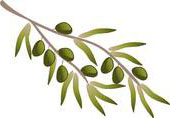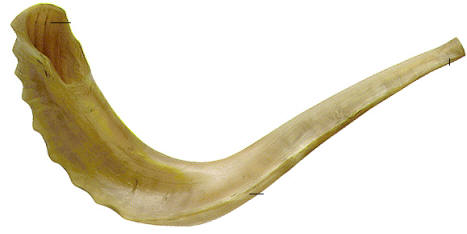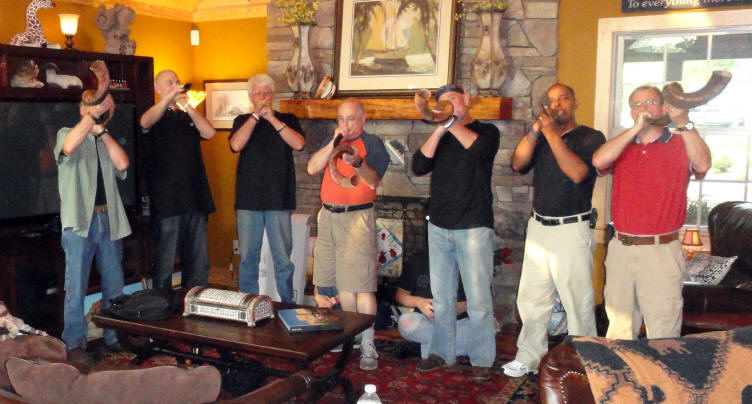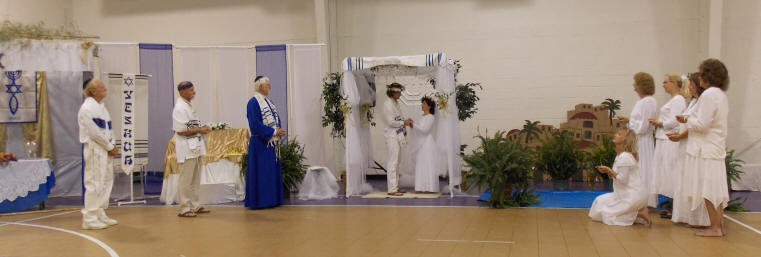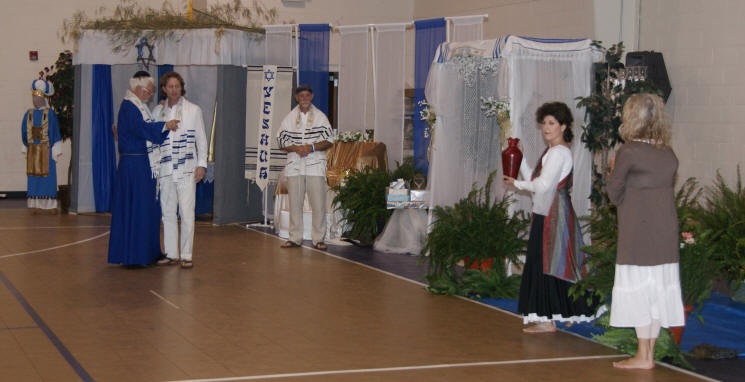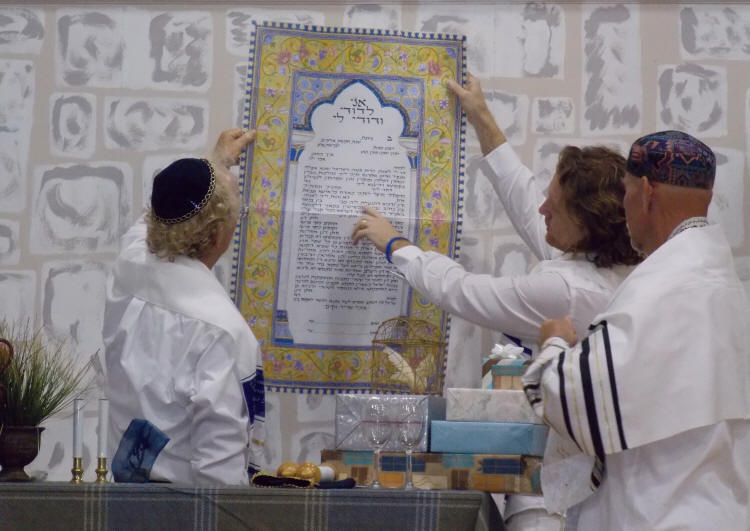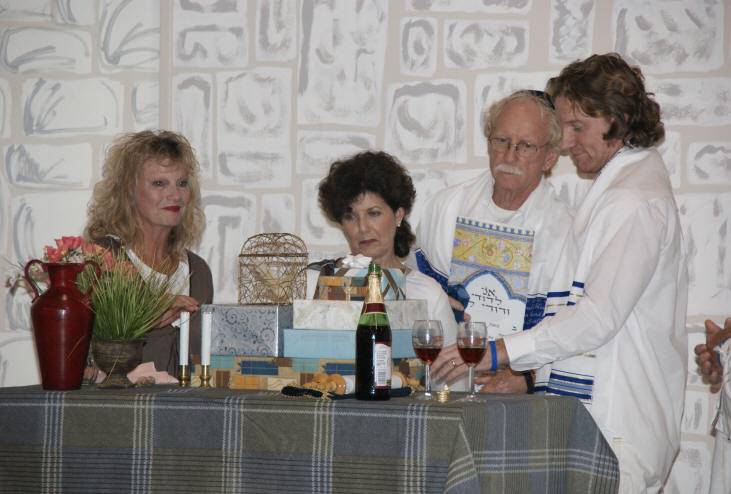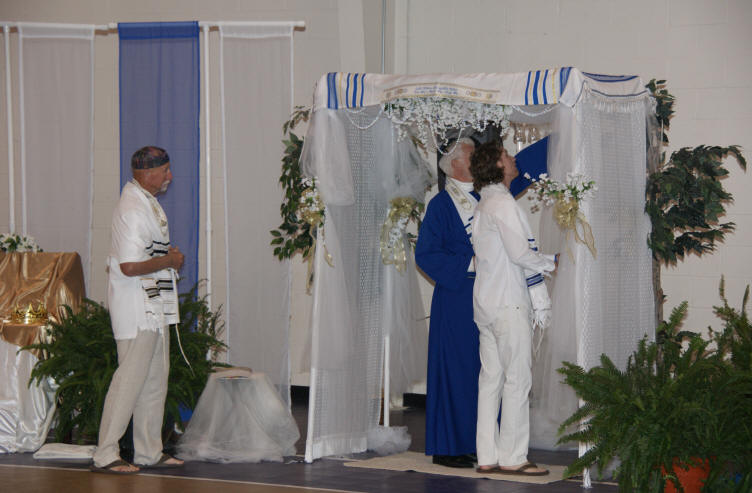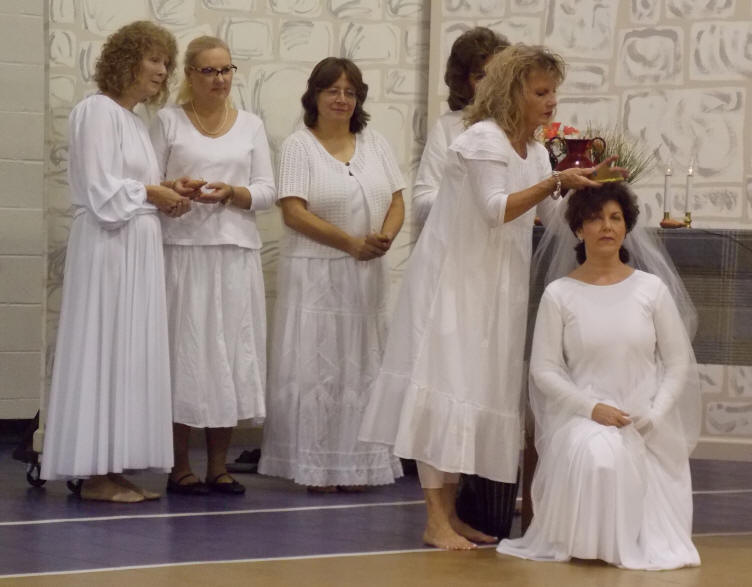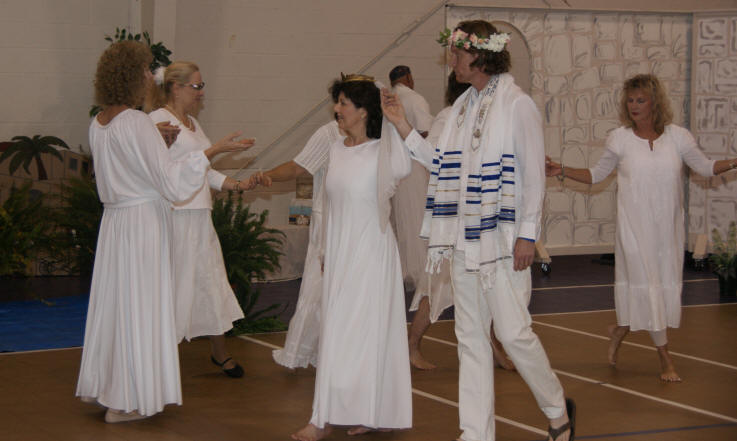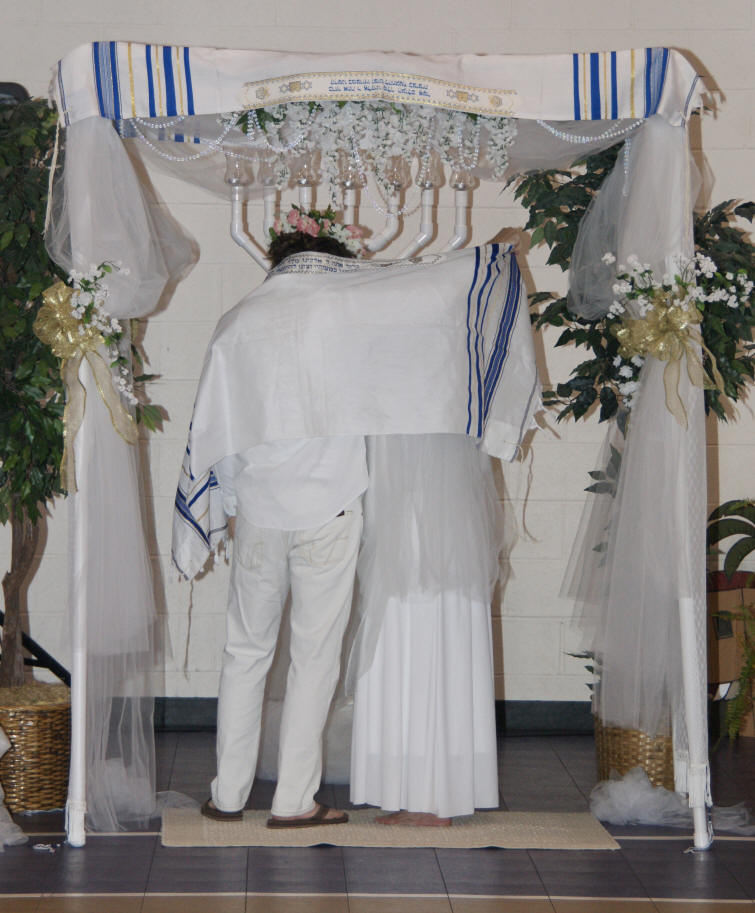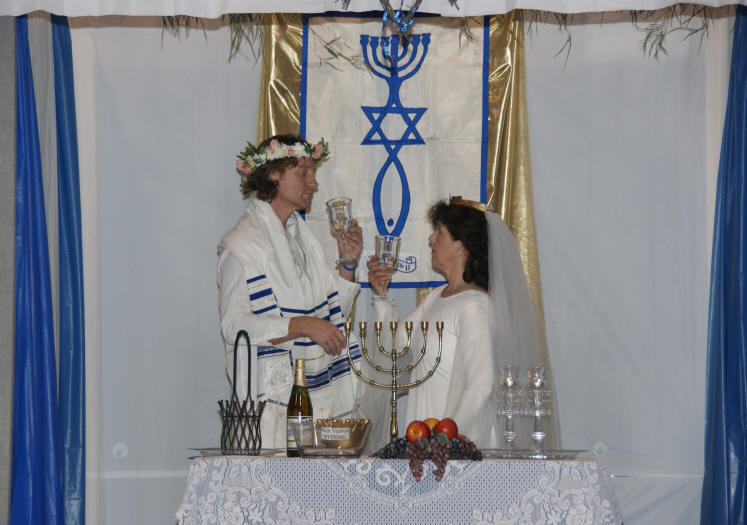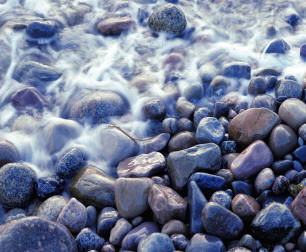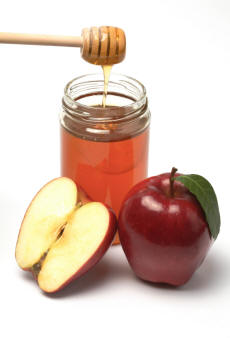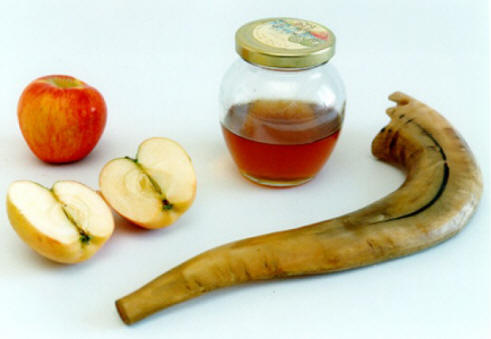Beit Yeshua
& Machol
Yom Teruah
Other Names
For Yom Teruah
Themes For
Yom Teruah
The
"Catching Away"
of the Bride
of Messiah
Tashlich
My First
Yom Teruah
Remembered
Torah
Reading
Holiday
Foods
Yom Teruah
Greeting
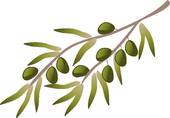
Yom Teruah
"The Day of the Awakening Blast"
"The Day of the Sounding of the Shofar"
"The Feast of Trumpets"
Yom Teruah is a two day festival falling in the Autumn (September or October) of each year, on Tishri 1 & 2, and is considered one long day. The festival is known as the Feast of Trumpets in Christianity and is better known as Rosh Hashanah in Judaism. Yom Teruah coincides with Rosh Hashanah - which literally means "Head of the Year" - and is the beginning of the Civil Calendar in Israel. The Religious Calendar begins with the month of Nisan (March April) in Judaism. Leviticus 24:24
Speak to the children of Israel, saying, In the seventh month, in the first day of the month, shall ye have a Sabbath, a memorial of blowing of trumpets, an holy convocation.Elul is the Hebrew month on the Jewish calendar before Tishri. The 30-day period of time prior to Yom Teruah is called "Teshuvah" which is a Hebrew word meaning "Return" or "Repent". Teshuvah is a time for self examination and retrospection - a time to repent of sins - and "set things right", not only with the Lord, but also with those around you. To see the Daily Meditations for Teshuvah, Click Here.
The 10-day period of time beginning with Yom Teruah (Tishri 1) and ending with Yom Kippur/Day of Atonement (Tishri 10) is referred to as the "High Holy Days", or the "Days of Awe". Blowing the Shofar on Yom Teruah is the only specific commandment in Scripture for the holiday.
Numbers 29:1
And in the seventh month, on the first day of the month, ye shall have an holy convocation; ye shall do no servile work: it is a day of blowing the trumpets unto you.Traditionally the shofar is sounded with one held blast called Tekiah; followed by three broken blasts called Shevarim; followed by nine even faster broken blasts called Teruah. The Tekiah, Shevarim and Teruah each last the same length of time - sounding the set of sounds three times. The shofar sounding concludes by blowing and holding a final blast as long as you can (until you run out of breath). This final blast is called Tekiah Gedolah. There is no specific Biblical command on "how" the shofar is to be blown - only that it is to be sounded.
To hear and see the sounding of the Shofar, CLICK HERE
Sounding shofarot at Friday night Erev Shabbat home-group meeting
To see Jonathan & Andi's Yom Teruah video - CLICK HERE
They blow the shofar (with a little help from Alex, Paul & Susan) and observe TashlichOther Names for Yom Teruah
Like most of the Biblical Feasts, Yom Teruah is called by a variety of names. Other names for Yom Teruah include ...
* The Feast of Trumpets
* The Feast of the Last Trump
* The Day of the Awakening Blast
* The Day of the Sounding of the Shofar
* The Jewish New Year
* The Head of the Year (Rosh Hashanah)
* The Feast of the Born Again
* The Day of Remembrance (Yom Ha'Zikkaron)
* The Day of Judgment (Yom Ha'Din)
* The Day of the King (Yom Ha'Meleck (Referring to Coronation Day)
* The Hidden Day (Yom Ha'Kiseh (Referring to the New or Hidden Moon)Yeshua said no man knows the day or the hour. This was a Hebrew idiom referring to the “catching away” of Believers that would take place on this “hidden” festival.
Just as Yom Teruah has numerous names, there are also numerous themes associated with the festival. Yeshua fulfilled the Spring Feasts with His first coming - Pesach/Passover (Yeshua's death), Feast of Unleavened Bread (Yeshua's burial), Feast of Firstfruits (Yeshua's resurrection), and Shavuot/Pentecost (the giving of the Ruach Ha'Kodesh - the Holy Spirit). Themes for Yom Teruah include ... * The Catching away of the Bride (the Rapture)
Rabbis taught that after being resurrected on the Feast of Trumpets, they would enter the chupa, or wedding canopy for 7 days (or seven years prophetically) while 7 years of judgment occurs on earth.
* The Resurrection of the dead
* The Coronation of the King (Messiah Yeshua)
* The Marriage of Messiah and His Bride
* Birthday of the World – Jews believe that God created the world on Tishri 1.
* God Judges the world and your name is written (inscribed) in one of the books that God Himself keeps - the "Book of Life" or the "Book of the Righteous".
Phrases referring to Yom Teruah …
* The gates were opened"Ani L'Dodi V'Dodi Li - I am my Beloved's and my Beloved is mine" The "Catching Away" of the Bride of Yeshua
Yeshua is coming back for a bride that is "without spot or blemish". Will she look like the traditional church of the past, or will she look more like a young Jewish virgin? God is restoring many things to Believers - things that had been lost to them through Roman Emperor Constantine and other early church leaders. As the time approaches, God is making us more aware of the Hebrew roots of our faith and preparing us physically and spiritually to be the Bride of Messiah Yeshua.
Luke 21:24, 27-28, 32
Jerusalem shall be trodden down of the Gentiles, until the times of the Gentiles be fulfilled. And then shall they see the Son of man coming in a cloud with power and great glory. And when these things begin to come to pass, then look up, and lift up your heads; for your redemption draweth nigh. Verily I say unto you, This generation shall not pass away, till all be fulfilled.Israel reclaimed Jerusalem and the Temple Mount in 1967 in "The Six-Days War" when they were attacked by Egypt, Jordan and Syria (a war that also eventually included Iraq, Saudia Arabia, Morocco, Algeria, Libya, Kuwait, Tunisia, and the Sudan). Although greatly outnumbered, with God's help, the Israelis emerged victorious, gaining control of the Gaza Strip and the Sinai Peninsula from Egypt, the West Bank and East Jerusalem from Jordan, and the Golan Heights from Syria. Why is this important and listed in this section under the "Catching Away" of Believers? Because for the first time in 2000 years, the Gentile nations were no longer in control of Jerusalem.
When I read this in Don Finto’s book, Your People Shall Be My People in 2002, I actually wept as I read the scripture from Luke 21. It’s as clear as the nose on your face. Yeshua is coming in this generation for a people who say, "Baruch Ha Ba B'Shem Adonai" - "Blessed is He who comes in the name of the LORD"!
1 Thessalonians 4:16-17
For the Lord himself shall descend from heaven with a shout, with the voice of the archangel, and with the trump of God: and the dead in Christ shall rise first: Then we which are alive and remain shall be caught up together with them in the clouds, to meet the Lord in the air: and so shall we ever be with the Lord.1 Thessalonians 5:1-2, 4
But of the times and the seasons, brethren, ye have no need that I write unto you. For yourselves know perfectly that the day of the Lord so cometh as a thief in the night. But ye, brethren, are not in darkness that that day should overtake you as a thief.The "Day of the Lord" will not "overtake" us.
The Ancient Jewish Wedding Drama at Beit Yeshua A proper understanding of the fall feast days of Yom Teruah, Yom Kippur and Succot provides clarity to Yahweh's plan for the prophetic fulfillment we call the End Times. They reveal much more detail than has been thought possible.
The Bible itself is a marriage covenant. Both the Tanach (the Old Testament) and the Brit Hadashah (the New Testament) describe how God through Messiah Yeshua, the Bridegroom, is in the process of marrying His Bride. Yeshua’s first miracle - turning water into wine - took place at a wedding in Cana of Galilee.
There are many parallels between the ancient Jewish Wedding and the marriage between Messiah Yeshua and his Bride. Yeshua even referred to Himself the Bridegroom. These parallels paint a beautiful picture of the love relationship between Yeshua and his Bride.
Marriage is a picture of God’s desire to unite in fellowship with mankind, just as the bridegroom Yeshua, our Messiah, longs to be with His bride, His “Called Out Ones”. Since He has appointed marriage between a man and a woman to testify of His own predestined plan, it is holy, even as He is holy. Because of this, the Bride is to be prepared with purity, having eyes only to please her groom. Likewise the groom comes to the bride sacrificing His own life for her, and forsaking all others in order to love her only.Parts of the Ancient Jewish Wedding:
1. Choosing the Bride The Bridgroom spots the Bride
2. The Betrothal 1 Peter 1:8
Whom having not seen, ye love. (referring to Messiah and His bride)Hosea 2:19-20
I will betroth you to me forever; I will betroth you in righteousness and justice, In love and compassion. I will betroth you in faithfulness, and you will acknowledge the LORD.3. The Bride Price 1 Corinthians 6:19-20
You are not your own; You were bought at a price. Therefore honor God with your body.4. The Wedding Contract Jeremiah 31: 31-33
"The time is coming,” declares the LORD, “when I will make a new covenant with the house of Israel and with the house of Judah. It will not be like the covenant I made with their forefathers when I took them by the hand to lead them out of Egypt, because they broke my covenant, though I was a husband to them,” declares the LORD. “This is the covenant I will make with the house of Israel after that time,” declares the LORD. “I will put my law in their minds and write it on their hearts. I will be their God, and they will be my people.Hebrews 8:10
This is the covenant I will make with the house of Israel after that time, declares the Lord. I will put my laws in their minds and write them on their hearts.The Bridgroom shows the Ketuba to the Bride's Father
5. The Bride's Consent Romans 10:9-10
If thou shalt confess with thy mouth the Lord Jesus, and shalt believe in thine heart that God hath raised him from the dead, thou shalt be saved. For with the heart man believeth unto righteousness; and with the mouth confession is made unto salvation.6. Wedding Garments Ezekiel 16:8-13
“When I passed by you again and looked upon you, indeed your time was the time of love; so I spread My wing over you and covered your nakedness. Yes, I swore an oath to you and entered into a covenant with you, and you became Mine,” says the Lord GOD. “Then I washed you in water; yes, I thoroughly washed off your blood, and I anointed you with oil. I clothed you in embroidered cloth and gave you sandals of badger skin; I clothed you with fine linen and covered you with silk. I adorned you with ornaments, put bracelets on your wrists, and a chain on your neck. And I put a jewel in your nose, earrings in your ears, and a beautiful crown on your head. Thus you were adorned with gold and silver, and your clothing was of fine linen, silk, and embroidered cloth.Revelation 19:7-9
Let us be glad and rejoice, and give honour to him; for the marriage of the Lamb is come, and his wife hath made herself ready. And to her was granted that she should be arrayed in fine linen, clean and white; for the fine linen is the righteousness of the saints. And he saith unto me, Write, Blessed are they which are called unto the marriage supper of the Lamb. And he saith unto me, These are the true sayings of God.Revelations 3:5
Yeshua says … “He who overcomes shall be clothed in white garments, and I will not blot out his name from the Book of Life; but I will confess his name before My Father and before His angels.”7. The First Cup of Wine Matthew 26:27-29
(At the Pesach Meal with His disciples Yeshua) … took the cup, gave thanks and offered it to them, saying, “Drink from it, all of you. This is My blood of the covenant, which is poured out for many for the forgiveness of sins. I tell you, I will not drink of this fruit of the vine from now on until that day when I drink it anew with you in My Father’s kingdom.”Every time we share in the cup of Communion we are re-affirming our marriage Covenant with our Bridegroom Yeshua. 8. Gifts for the Bride The Bridegroom would then present Betrothal Gifts to his beloved Bride. James 1:17
Every good gift and every perfect gift is from above, and cometh down from the Father ...1 Corinthians 12:1, 4, 8-10
Now about spiritual gifts, brothers, I do not want you to be ignorant. There are different kinds of gifts, but the same Spirit. For to one is given by the Spirit the word of wisdom; to another the word of knowledge by the same Spirit; To another faith by the same Spirit; to another the gifts of healing by the same Spirit; To another the working of miracles; to another prophecy; to another discerning of spirits; to another divers kinds of tongues; to another the interpretation of tongues:The Bridegoom presents gifts to the Bride
9. The Bridegroom's Departure At this point the Bridegroom would depart from the home of his Bride’s family. 10. The Chadar He would then start building the CHADAR which was another room onto his father’s house that would be their eventual home together. John 14:1-3
Yeshua said: Do not let your hearts be troubled. Trust in God; trust also in me. In my Father’s house are many rooms; if it were not so, I would have told you. I am going there to prepare a place for you. And if I go and prepare a place for you, I will come back and take you to be with me that you also may be where I am.The Chadar (or Chuppah in this case) is prepared
11. The Bride's Mikvah The Bride also had things that she was attending to while waiting on her Bridegroom’s return. She went through a ritual washing before the wedding, called a Mikvah, which we as Believers in Messiah call Baptism. Mark 16:16
He who believes and is baptized will be saved.12. The Bride is Consecrated The Bride was consecrated and set apart for a period of time while the bridegroom was away building the house. Matthew 25
1Then shall the kingdom of heaven be likened unto ten virgins, which took their lamps, and went forth to meet the bridegroom. 2And five of them were wise, and five were foolish. 3They that were foolish took their lamps, and took no oil with them: 4But the wise took oil in their vessels with their lamps. 5While the bridegroom tarried, they all slumbered and slept. 6And at midnight there was a cry made, Behold, the bridegroom cometh; go ye out to meet him. 7Then all those virgins arose, and trimmed their lamps. 8And the foolish said unto the wise, Give us of your oil; for our lamps are gone out. 9But the wise answered, saying, Not so; lest there be not enough for us and you: but go ye rather to them that sell, and buy for yourselves. 10And while they went to buy, the bridegroom came; and they that were ready went in with him to the marriage: and the door was shut. 11Afterward came also the other virgins, saying, Lord, Lord, open to us. 12But he answered and said, Verily I say unto you, I know you not. 13Watch therefore, for ye know neither the day nor the hour wherein the Son of man cometh.13. The Day and the Hour Neither the Bridegroom nor the Bride knew the actual day of the Wedding. Only the Bridegroom’s Father knew “the Day and the Hour” of the His Return. Mark 13:32
But of that day and hour knoweth no man, no, not the angels which are in heaven, neither the Son, but the Father.2 Peter 3:10
But the day of the Lord will come as a thief in the night.14. The Witness Dispatched and the Shofar Sounded When the time was right the Bridegroom’s Father would tell His son that the room was completed and that it was time to go and “catch away” the Bride. The Bride wears a gold crown resembling the skyline of Jerusalem
1 Thessalonians 4:16-17
For the Lord himself shall descend from heaven with a shout, with the voice of the archangel, and with the trump of G-d: and the dead in Christ shall rise first: Then we which are alive and remain shall be caught up together with them in the clouds, to meet the Lord in the air: and so shall we ever be with the Lord.15. The Bridegroom Cometh The Bridegroom would return with a shout and the sounding of the Shofar. Joel 2: 16
Gather the people, sanctify the congregation, assemble the elders, gather the children, and those that suck the breasts: let the bridegroom go forth of his chamber, and the bride out of her closet.16. The Bride "Caught Away" at Midnight At Midnight the Bridegroom would meet his Bride. Matthew 25
6And at midnight there was a cry made, Behold, the bridegroom cometh; go ye out to meet him.The Catching-Away
1 Thessalonians 5:1-2
Now as to the times and the seasons, brethren, you have no need of anything to be written to you. For you yourselves know full well that the day of the Lord will come just like a thief in the night.1 Corinthians 15:51-52
Listen, I tell you a mystery: We will not all sleep, but we will all be changed in a flash, in the twinkling of an eye, at the last trumpet. For the trumpet will sound, the dead will be raised imperishable, and we will be changed.17. Seven Circles around the Bridegroom Based on Jeremiah 31:22, the Bride would walk around the Bridegroom seven times. Jeremiah 31:22
... A woman shall compass a man.18. The Consummation of the Marriage The Bridegroom and His Bride would spend 7 days alone in the Bridal Chamber (or Chuppa) where they would consummate their marriage. Seven days alone in the Bridal Chamber
19. A King and a Queen On their wedding day, the Bridegroom is seen as a king and his Bride as a queen. They are lifted up on chairs by the men and danced around in a circle. The Coronation of King Yeshua is another major theme of Yom Teruah (The Feast of Trumpets). Messiah’s Coronation will happen in heaven prior to His physical return to Earth. Revelation 5:11-14
Then I looked and heard the voice of many angels, numbering thousands upon thousands, and ten thousand times ten thousand. They encircled the throne and the living creatures and the elders. In a loud voice they sang: “Worthy is the Lamb, who was slain, to receive power and wealth and wisdom and strength and honor and glory and praise!” Then I heard every creature in heaven and on earth and under the earth and on the sea, and all that is in them, singing: “To him who sits on the throne and to the Lamb be praise and honor and glory and power, for ever and ever!” The four living creatures said, “Amen,” and the elders fell down and worshiped.20. The Marriage Supper After the marriage was consummated, there was an enormous Wedding Feast or Marriage Supper.
Tashlick is a popular practice among Jews and Messianics alike. It’s common to walk to a place where there is a flowing body of water (lake, stream, etc) and throw pebbles (that you’ve picked up along the way) or bread crumbs (that you’ve carried in your pockets) into the water. Tashlick means “casting off” referring to our casting off of the sin in our lives. Tashlich is based on the scripture from Micah
Micah 7:18-20
Who is a God like you, who pardons sin and forgives the transgression of the remnant of his inheritance? You do not stay angry forever but delight to show mercy. You will again have compassion on us; you will tread our sins underfoot and hurl all our iniquities into the depths of the sea. You will be true to Jacob, and show mercy to Abraham, as you pledged on oath to our fathers in days long ago.Carolyn and I experienced our first Yom Teruah service in 1991. We had gone to a weekend seminar in Colombia, SC sponsored by Morning Star Drama & Dance Ministries and its founder, Helen Cregger. The weekend conference was to teach us about the three fall festivals.
We had been asked to bring white to wear Saturday night, the night we would be celebrating Yom Teruah I must tell you that it was an impressive sight when we walked into the conference room and there were hundreds of people all dressed in white. They gave all the ladies white veils and all the men white yarmulkas as they entered the doors. Singers, musicians, and the congregation sang, dancers danced, actors acted out their parts of the story that told of the catching away of the bride of Messiah.
At one point they brought long pieces of silk fabric over the congregation, representing the chupa. What a wonderful experience it was.
One of the Hebrew words for "Feast" is a word that means "Rehearsal". What a wonderful way to learn more about the Hebrew roots of your faith, and God's time line that is so clearly pointed out in the Festivals of the Lord.Torah Reading for Tom Teruah
Abraham's Binding of Isaac
Genesis 22 is usually read on the second day of Yom Teruah. This is the story of Abraham’s willingness to sacrifice his only son, Isaac, and his devotion to God. It's also believed by some teachers that Isaac wasn't a young "boy" - but perhaps a young "man" - around the age of 33. If this is indeed the case, it gives additional insight into the sacrifice of Isaac. As a young "man", Isaac could have easily overpowered his father - indicating that he became a "willing" sacrifice. But then an angel stopped Abraham and God provided a ram in the thicket for the sacrifice. The most common holiday food for Yom Teruah is apples dipped in honey – for a sweet year.
Yom Teruah Greeting
The common greeting for Yom Teruah/Rosh Hashanah is “L’Shanah Tovah”
which means may you be inscribed for a good year, or Happy New Year.L'Shanah Tovah
